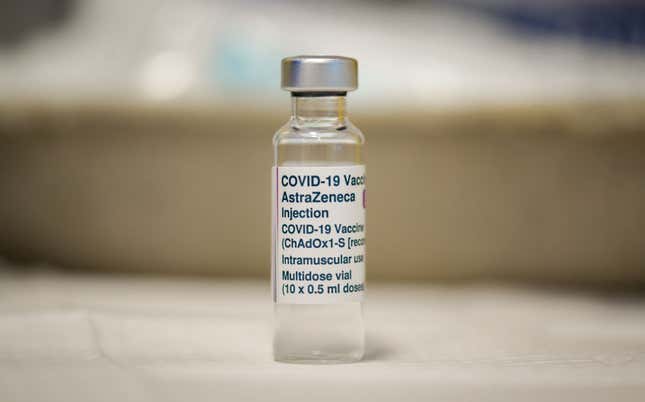
A new COVID-19 vaccine could be coming to American shores soon: the AstraZeneca shots, which were first authorized for use in Europe.
On Monday, AstraZeneca announced that a recently completed U.S. trial has shown its vaccine is 79 percent effective at preventing symptomatic COVID-19 and 100 percent effective at preventing severe disease and hospitalization, reports AP.
The company plans to seek emergency use authorization from the U.S. Food and Drug Administration at the beginning of April, said AstraZeneca’s Rudd Dobber. The vaccine has already been in use in several European nations and is also authorized in over 70 countries across the globe—including those in Africa, Asia and South America—as part of the COVAX program from the U.N. and World Health Organization to increase equity in global COVID-19 vaccine access.
But AstraZeneca has had to combat concerns about the seriousness of the side-effects of its vaccines due to reports of several people experiencing blood clots after getting doses—including a few who have suffered fatalities, according to WBUR. Last week, the Netherlands, Denmark, Finland, Georgia, Cameroon and several other countries suspended the administration of AstraZeneca doses in their nations following the cases of serious illness and death in people who had been administered the vaccine, reports Reuters.
On Thursday, however, the European Medicines Agency said its investigations found that the AstraZeneca vaccine does not raise the risk of blood clots compared to the overall rate of blood clots in the general population. The agency concluded that the benefits of the vaccine outweigh any risks, and several of the nations who had suspended their use of the vaccine have resumed administering doses. AstraZeneca said on Monday that an independent panel’s review of its latest trial also found that the vaccine has no higher risk of causing blood clots. But polling in Europe shows that the public’s trust in the vaccine has dropped sharply. Similar concerns about safety will likely arise as the company attempts to bring its inoculations to America.
The latest trial included over 30,000 participants from the U.S., Peru and Chile, to whom two doses of the AstraZeneca vaccine, or a placebo, were given four weeks apart. The findings of the trial will now be peer-reviewed, after which the FDA is expected to evaluate the company’s vaccine and determine if it should be authorized for emergency use in America.

